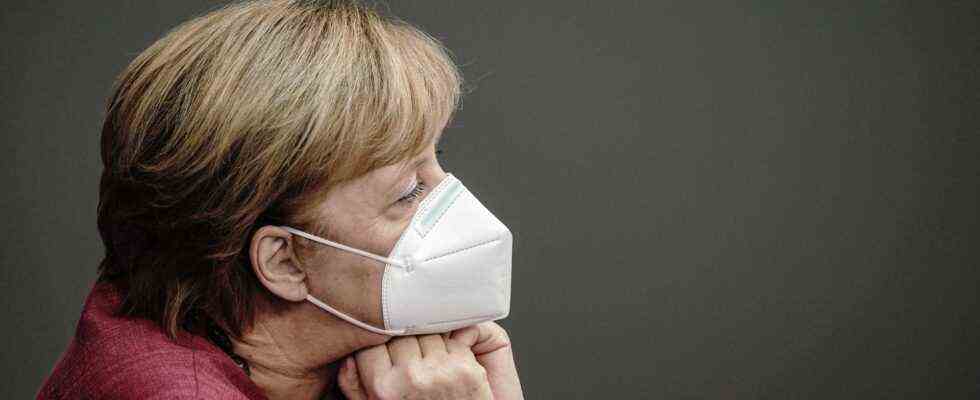analysis
Status: 02.12.2021 1:28 p.m.
Her political style set new standards, as did her modesty. Angela Merkel experiences a lot of fame at the end of her chancellorship. But Corona thwarted her plans.
Up to the last few meters of her chancellorship, Angela Merkel was now ruled by an invisible power: a virus called SARS-CoV-2. At the big tattoo on Thursday evening in Berlin, with which the Chancellor is traditionally bid farewell, the number of guests had to be reduced for the farewell to Germany’s first female Chancellor. The usual reception afterwards was completely canceled due to the pandemic. But politically, too, this unusual global crisis may have changed the Chancellor’s balance sheet a lot.
She enjoys great respect in the country and is recognized worldwide by the leaders of the state – ex-US President Barack Obama, for example, recently sent her an eulogy that bordered on a declaration of love for her “relentless moral compass” as a video message to her last EU summit in Brussels. And if the corona pandemic hadn’t come to the end of her chancellor’s years, the waiting, moderating and engaging political style she had shaped would have been raised to an even larger monument base, her balance sheet would have been more immaculate.
“The dark side of their political style”
But as it was, the corona pandemic thwarted her plans at the end of her term of office. And that although many acknowledged that, as a doctor of science, she recognized more clearly and more quickly than some of the prime ministers what exponential growth means in the first waves of the pandemic. “You could have put through a federal emergency brake in 2020”, judges the journalist and historian Ralph Bollmann, one of your biographers. She did not do it “because she shied away from the risk and was used to spreading responsibility over many shoulders and including everyone.” Here the dark side of her political style clearly showed.
This crisis is different from the others
Merkel is considered to be the crisis-tested Chancellor, whose years in office from 2007 onwards one crisis after another emerged – be it the euro and financial crisis, the crisis of German and European refugee policy in 2015, be it Brexit, the Trump election, Ukraine -Conflict and the climate crisis. They earned her the image of a level-headed head of government who likes to think about decisions from the end. According to Bollmann, the pattern works in man-made crises, but not in such a natural disaster with unpredictable infection rates.
This coronavirus has become an unreasonable expectation for a politician who likes to think, weigh and hesitate in long periods of time before deciding. Not only when it comes to the question of whether she still wanted to enter this legislature. She was already accused of this in the 2008 financial crisis. This virus brought her, the experienced long-time Chancellor, to her own limits late on. To the limits of their power – even if it is just the power of words to convince people of their political actions.
The pandemic turned her, the often hesitant, into an impatient one herself, who now often quarreled with the polyphony and sometimes hesitation, for example when restricting hotel stays in the federal-state votes: Because they unfolded a braking effect on the corona policy , while Merkel saw the incidence curves grow. But the Corona crisis also revealed unfamiliar sides of her: Otherwise more objective in conversations and speeches, as she developed great passion in the Bundestag in the course of the crisis for her circumstances.
Unusually emotional appearance in the Bundestag
December 2020 will be followed by Merkel’s most emotional, personal appearance that she has ever had in the Bundestag – in view of 590 deaths a day that are unacceptable: “We are living with a challenge that the Federal Republic of Germany has not yet seen in this form Kind of knew. ” You have to react particularly in a special situation: Standing at the desk, she literally begs, wringing her hands, to reduce contacts especially before Christmas so that it won’t be the last Christmas with the grandparents afterwards. Many observers saw tears in their eyes.
For a long time, autumn 2015, the crisis in refugee policy, was considered to be the defining momentum of Merkel’s chancellorship. CDU politician Peter Altmaier, who has closely accompanied the Chancellor in many political functions, saw it that way. In the meantime, he considers the corona pandemic to be the greatest challenge for their chancellorship, “because it was a completely new crisis for which there were no instructions and no scripts”. This was also the crisis in which Angela Merkel played the “greatest personal role,” said the 63-year-old in an interview with the ARD capital studio.
At the end of Merkel’s chancellorship, the pandemic in Germany reached a new, sad climax.
Image: dpa
Has the pandemic changed the Chancellor?
Has the pandemic changed Merkel as a politician? One can assume that. In a conversation in the “Süddeutsche Zeitung” that assessed her chancellorship, she reported looking back on the first year of the pandemic on the “permanent conflict between Chancellor Merkel and the scientist Merkel” in autumn 2020: “Some facts were so evident, and yet it took time to react politically “. Nevertheless, preventive action could not be implemented – shops and schools were only closed when the number of cases rose and the load on the intensive care units was “extremely high”. are. Now the drama is repeating itself in spite of a vaccination quota of around 69 percent, which has now exceeded 100,000 deaths. A situation that the Chancellor will certainly be anything but carefree about these days when she left her office, which she had held for 16 years.

